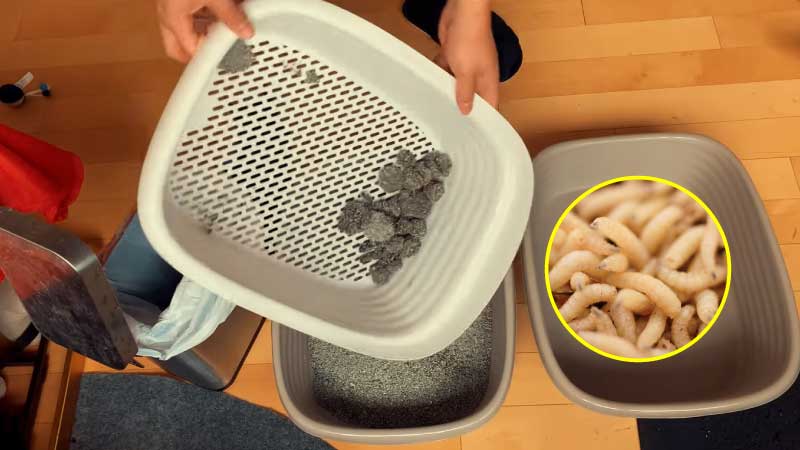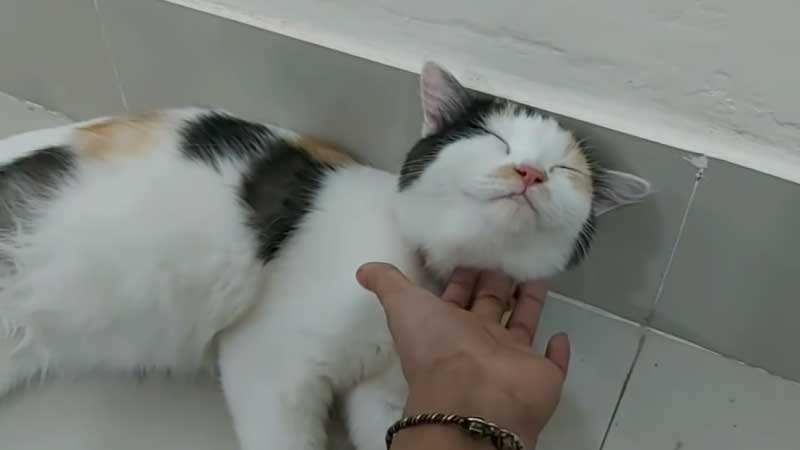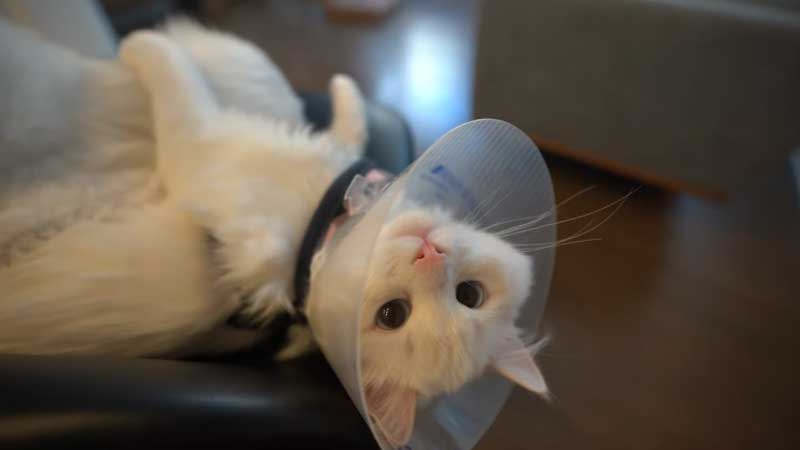Maintaining a clean and hygienic litter box is a top priority for any cat owner. Not only does it ensure the health and comfort of your feline friend, but it also keeps your home environment pleasant. However, a common and rather distressing issue that pet owners may encounter is the presence of maggots in the litter box. This not only poses a hygiene concern but can also indicate underlying problems that need immediate attention.
Maggots, the larvae of flies, can infest litter boxes when flies are attracted to the waste and lay their eggs. These tiny, wriggling pests can be more than just a nuisance; they can also pose health risks to both your pet and your household. Understanding the causes of maggot infestation and how to keep maggots out of litter box is crucial.
In this comprehensive guide, we delve into the causes of maggot infestation in cat litter boxes, offering practical and effective solutions to prevent and eradicate this problem.
Table of Contents
What Causes Maggot Infestation in Litter Boxes?
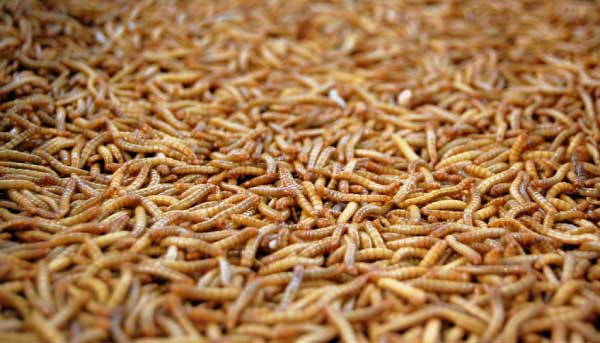
Maggot infestation in litter boxes is not just an unpleasant issue, but it can also be a puzzling one for many cat owners. Understanding the causes of this problem is the first step in effective prevention and treatment.
Here, we explore the primary factors that lead to maggot infestation in cat litter boxes, accompanied by a table chart for a clearer understanding.
Key Factors Leading to Maggot Infestation
| Factor | Description | Prevention Tips |
|---|---|---|
| Unhygienic Conditions | Infrequent cleaning of the litter box. | Regularly clean and replace the litter. |
| Warm and Humid Environment | High moisture and temperature. | Keep the litter box in a cool, dry area. |
| Exposed Waste | Cat waste not promptly removed. | Clean waste daily; consider a self-cleaning litter box. |
| Presence of Flies | Flies in the home or surrounding area. | Use fly repellents and maintain a clean home. |
| Health Issues in Pets | Conditions in cats that attract flies. | Regular vet check-ups and proper pet hygiene. |
Maintaining cleanliness and hygiene, along with being attentive to the health of your cat, are fundamental steps in ensuring a maggot-free environment.
How to Keep Maggots Out of Litter Box: Preventive Measures to Avoid
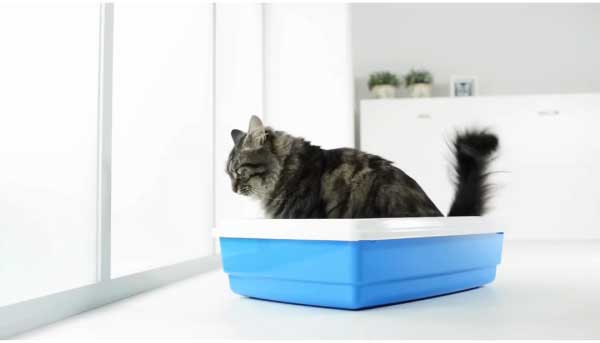
Here are the key preventive measures you can take:
Regular Cleaning Routine
Daily Scooping: Remove feces and clumped urine from the litter box at least once a day. This reduces the chances of attracting flies that can lay eggs.
Frequent Litter Replacement: Completely change the litter and thoroughly clean the box on a regular basis, ideally every week. This helps in eliminating any eggs or larvae that may have been laid.
Clean With Safe Disinfectants: Use pet-safe disinfectants to clean the litter box during each litter change. Avoid harsh chemicals that could harm your cat.
Environmental Control
Proper Placement of the Litter Box: Keep the litter box in a cool, dry area. High humidity and warmth can accelerate the development of maggots.
Fly Control in the Home: Use fly screens on windows and doors to prevent flies from entering your home. Fly traps and electric fly zappers can also help reduce the fly population.
Adequate Ventilation: Ensure good air circulation around the litter box area. This helps to keep the area dry and less attractive to flies.
Choice of Litter
Use Absorbent Litter: Choose a highly absorbent litter that locks in moisture and odor. Some litters are designed to repel insects and might be a good option.
Non-Attracting Litter: Avoid using litters with strong perfumes or scents that might attract flies.
Cat Health and Hygiene
Regular Veterinary Check-Ups: Ensure your cat is in good health. Diarrhea or other health issues can increase the likelihood of maggot infestation.
Grooming and Hygiene: Regular grooming and cleaning of your cat can prevent fecal matter from being trapped in their fur, which can attract flies.
Waste Management
Secure Trash Storage: Dispose of scooped waste in a sealed bag and ensure your trash cans are tightly closed. This will prevent attracting flies to your household waste.
Immediate Disposal of Waste: Dispose of the waste immediately after scooping. Don’t leave it sitting in a trash can near the litter box.
By following these preventive measures, you can significantly reduce the risk of a maggot infestation in your cat’s litter box.
Immediate Solutions to Remove Maggots from Litter Boxes
If you find maggots in your cat’s litter box, it’s important to act quickly to eliminate them and prevent their return. Here are immediate solutions to address maggot infestations effectively:
Solution 1: Thorough Cleaning of the Litter Box
- Remove and Dispose: Start by removing all the litter and disposing of it securely in a sealed bag. This includes any maggots and eggs present in the litter.
- Clean the Box: Wash the litter box thoroughly with hot water and a pet-safe disinfectant or a mild detergent. Ensure to reach every corner and crevice where eggs might be hidden.
Solution 2: Natural Remedies
- Diatomaceous Earth: Sprinkle food-grade diatomaceous earth in and around the litter box after cleaning. It’s a natural, non-toxic powder that dehydrates and kills maggots.
- White Vinegar Solution: Use a mixture of white vinegar and water to clean the area around the litter box. Vinegar acts as a natural disinfectant and can deter flies.
Solution 3: Use of Commercial Products
- Insecticidal Sprays: Use a pet-safe insecticidal spray in the area where the litter box is kept to kill any lingering flies or maggots. Ensure the product is safe for use around pets.
- Fly Traps: Set up fly traps near the litter box area to capture and kill adult flies, thereby preventing them from laying more eggs.
Solution 4: Immediate Environmental Adjustments
- Improve Ventilation: Increase airflow in the area where the litter box is located to help keep it dry and less attractive to flies.
- Limit Access to Flies: Ensure that windows and doors are screened, and seal any gaps where flies could enter.
Solution 5: Monitoring and Maintenance
- Regular Checks: For a few days after the infestation, check the litter box frequently for signs of maggots.
- Daily Cleaning: Reinforce the habit of scooping the litter box daily and changing the litter more frequently.
Solution 6: Consulting a Veterinarian
If you suspect that the infestation might be related to your cat’s health (e.g., diarrhea attracting flies), it’s advisable to consult a veterinarian to address any underlying health issues.
Taking these immediate steps can help you quickly address a maggot infestation in your cat’s litter box.
FAQs: Frequently Asked Questions
How Do I Know if My Cat’s Litter Box Has Maggots?
Maggots are small, white, worm-like larvae that can be seen wriggling in the litter. They are most commonly found near feces or in areas where the litter is heavily soiled.
Can Maggots Harm My Cat?
While maggots themselves are not likely to harm a healthy cat, they are indicative of unsanitary conditions that can lead to health issues. Additionally, flies, which are the source of maggots, can spread diseases.
What Is the Fastest Way to Get Rid of Maggots in a Litter Box?
The fastest way is to thoroughly clean and disinfect the litter box, dispose of the old litter, and use pet-safe insecticidal products or natural remedies like diatomaceous earth to eliminate any remaining maggots.
Why Does My Cat’s Litter Box Keep Getting Maggots?
Recurrent maggot infestation is often due to insufficient cleaning, warm and humid conditions, or the presence of flies in the home. Addressing these factors is crucial for preventing re-infestation.
Are There Any Cat Litters Available That Prevent Maggots?
While no litter can completely prevent maggots, some litters are designed to be less attractive to flies, such as those with odor-control properties or natural insect-repelling ingredients.
How Can I Prevent Flies from Being Attracted to the Litter Box?
Keeping the litter box clean, disposing of waste promptly, using covered litter boxes, and ensuring good ventilation can help. Additionally, using fly repellents and maintaining overall household cleanliness are effective strategies.
Is It Safe to Use Insecticides Near My Cat’s Litter Box?
If using insecticides, it’s essential to choose products that are safe for use around pets. Always follow the manufacturer’s instructions and allow the area to air out before letting your cat use the litter box again.
Can Improper Diet in Cats Lead to Maggot Infestation in Litter Boxes?
An improper diet can lead to gastrointestinal issues in cats, such as diarrhea, which can make the litter box more attractive to flies. A balanced diet is important for overall health and hygiene.
Final Verdict
Maggot infestation in a cat’s litter box is a concerning issue, but with the right knowledge and practices, it can be effectively managed and prevented. The key takeaway is the importance of maintaining a clean, hygienic, and well-ventilated environment for your cat’s litter box. Regular cleaning, proper disposal of waste, and use of the right litter can significantly reduce the chances of infestation.
Regular health check-ups for your cat, maintaining good dietary habits, and ensuring overall cleanliness in your home also play a vital role in preventing maggot infestation. Remember, a clean litter box not only prevents issues like maggots but also contributes to the health and well-being of your feline friend.

